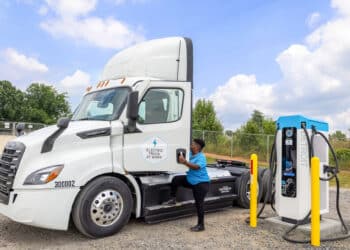As states enact tougher disclosure requirements, equipment discounters who serve as financiers face more disclosures than their broker counterparts.
State disclosure laws are a potential concern for equipment discounters, which technically are the originators or financiers of the transaction, Don Cosenza, chief marketing officer at North Mill Equipment Finance, said during a panel at the National Equipment Finance Association’s spring conference in Huntington Beach, Calif., last week.
“First, you’ve got the disclosure issues, and every state’s going to be different,” he said. “Since [the first commercial finance disclosure law in] California, general disclosure exemptions have become better and better so that we’re talking about the disclosure issue, [as in] who’s going to be building disclosure.”
California led the way both in terms of enacting disclosure law, with California launching its disclosure law on Dec. 9, 2022, and the stringency of the laws, Cosenza said.

Balancing brokers, discounters, and lenders
Since the equipment discounter finances the initial transaction, even if only to sell it, it is responsible for the disclosure agreements and liable under current state disclosure laws, while traditional brokers are not, he said.
“If you’re doing the discounting and you actually are the financer, you’re going to be doing the disclosure, not the funding source, because that’s where the money is coming from,” he said. “If you’re actually just brokering it … all you do is send the deal. The disclosures come from the financer, the broker hands them to the customer, and that’s it.”
For companies that offer brokering and discounting, just brokering a deal can simplify operations and avoid potential disclosure issues, Skip Wehner, manager of education at the National Equipment Finance Association, said during the panel.
“There’s a lot of risk that goes along with that, too, just like anything in life,” said Wehner, also former vice president and chief operating officer at the former independent finance company Pinnacle Capital Partners. “I’ve personally been a broker where I’m just selling based on the lender’s approval, just simply taking the fee because of the simplicity involved with that transaction, especially as you talk about disclosures.”
Avoiding agency issues
Another potential concern for equipment discounters that also operate as brokerages is the appearance of agency relationships in which one party shows more involvement than the nature of the agreement indicates, Cosenza said.
“The more the broker does, the more agency issues you’re going to have both with disclosure and liability if the broker has been doing something wrong,” he said. “We know that the funding source doesn’t want to get caught up in an agency relationship.”
The master discounting agreement or broker agreement should indicate what each party can and cannot do as far as representation, Cosenza said.
Lenders want to avoid problematic situations that arise “if my broker is doing something that he or she shouldn’t have by making outside representations that didn’t come into the disclosures or otherwise,” he said. “Remember that you’ve got the legal issues that are overlaid the same both with disclosures under various states’ laws and also, the agency problems you can get into.”
In addition to disclosure concerns, tax implications in a state such as California present a concern for discounters, as the leases represent an asset on the books for the discounters, Jaimie Haver, former senior vice president of operations for the commercial finance group at Hanmi Bank, said during the panel.
Register for the 2024 Equipment Finance Connect, which focuses on best practices in equipment finance, on May 5-7 in Nashville. Learn about the event and free dealer registration at EquipmentFinanceConnect.com.









